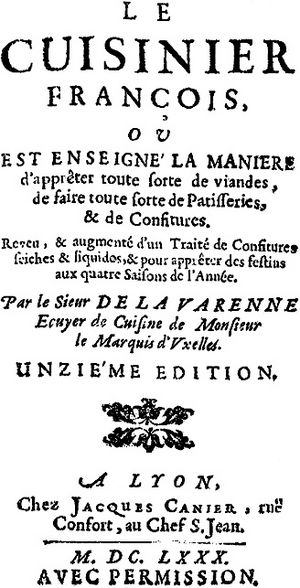François Pierre La Varenne facts for kids
François Pierre de la Varenne (born around 1615 in Burgundy, died 1678 in Dijon) was a very important French chef and writer. He wrote a famous cookbook called Le Cuisinier françois (published in 1651). This book is considered the starting point for modern French cuisine as we know it today.
In the 1600s, La Varenne changed French cooking. He moved away from the Italian cooking styles that were popular before. His book was for professional chefs. It helped to define French cooking during the time of King Louis XIV.
Contents
How French Cooking Changed
The 17th century was a time of big changes for French cooking. Before this, food often had many strong spices. But La Varenne helped chefs focus on the natural tastes of French foods.
Many exotic spices like saffron, cinnamon, and ginger were used less often. Instead, chefs started using local herbs more. These included parsley, thyme, bayleaf, chervil, sage, and tarragon.
New vegetables also became popular. These included cauliflower, asparagus, peas, cucumber, and artichoke. Chefs also learned to cook meat carefully to keep its full flavor. Vegetables had to be fresh and tender. Thanks to better transport, fish could also be very fresh. The goal was to show off the natural taste and look of ingredients, not hide them.
La Varenne's Culinary Innovations
La Varenne introduced many new cooking ideas. He created the first bisque, which is a creamy soup. He also invented Béchamel sauce, a classic white sauce.
Instead of using crumbled bread to thicken sauces, he used roux. A roux is a mix of fat (like butter) and flour. He also replaced lard (pork fat) with butter in many recipes.
His book was the first to use terms like bouquet garni. This is a bundle of herbs used to flavor dishes. He also wrote about fonds de cuisine (stocks) and reductions. Reductions are sauces made thicker by boiling them down. He also showed how to use egg whites to make liquids clear.
The book also had the first printed recipe for mille-feuille. This is a dessert with many layers of pastry. La Varenne also talked about how to cook vegetables, which was new at the time. He even had an early recipe for hollandaise sauce. It was a sauce for asparagus:
make a sauce with good fresh butter, a little vinegar, salt, and nutmeg, and an egg yolk to bind the sauce; take care that it doesn't curdle...
—[1]
Other Famous Books
Before Le Cuisinier françois, La Varenne wrote a book in 1650 about confitures. These are jams, jellies, and preserves. It also had recipes for syrups, compotes (fruit cooked in syrup), and many fruit drinks. There was even a section on salads.
La Varenne wrote a third book called Le Pâtissier françois (published in Paris in 1653). This was the first complete French book about making pastry. Later, all three of his books were published together in one collection.
His early books are very rare today. Like children's books, they were used so much in kitchens that they simply wore out!
Impact and Legacy
Le Cuisinier françois was very popular. Other publishers made copies without his permission in places like Amsterdam and The Hague. Soon, other chefs tried to copy his style.
His cookbook was also the first French cookbook translated into English. This English version, called The French Cook (London 1653), introduced many French cooking terms. Words like à la mode (in fashion), au bleu (very rare), and au naturel (natural) became common in cooking.
The book was a huge success. Over 250,000 copies were printed in about 250 different editions. It stayed in print until 1815!
La Varenne worked for ten years as the head chef (chef de cuisine) for the Marquis d'Uxelles. He dedicated his books to the Marquis. He also named a famous mushroom dish after him: duxelles. Duxelles is finely chopped mushrooms seasoned with herbs and shallots. It is still used today to flavor fish and vegetables.
Le Cuisinier françois was reprinted in 1983, allowing new generations to discover his work.
- La Varenne's cookery: The French Cook; The French Pastry Chef; The French Confectioner. A modern English translation and commentary by Terence Scully. Prospect Books, 2006.
See also
 In Spanish: François Pierre de la Varenne para niños
In Spanish: François Pierre de la Varenne para niños
 | Sharif Bey |
 | Hale Woodruff |
 | Richmond Barthé |
 | Purvis Young |


